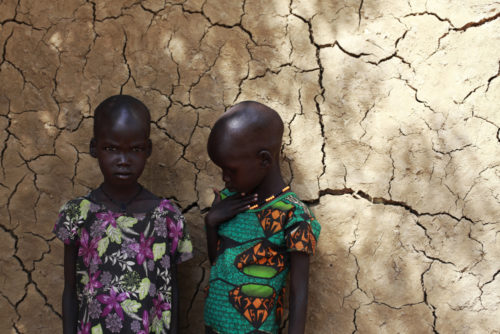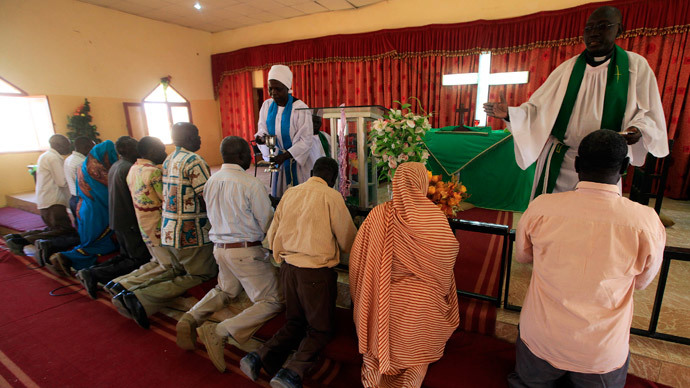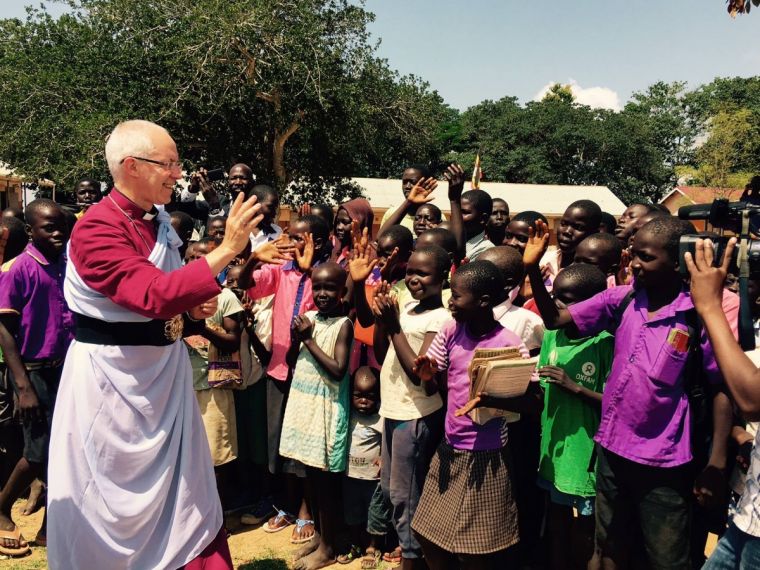Christians in Sudan face ethnic cleansing, and the US and UK are rewarding it
The US government is reported to be on the verge of dropping Sudan from its State Sponsors of Terror list, despite the regime's systematic bombardment of its own Christian civilians. The controversial move follows the lifting of sanctions against Khartoum in September.

Washington has improved its relations with Sudan under pressure from Saudi Arabia. There are currently thousands of Sudanese soldiers fighting Saudi's war in Yemen, of whom 400 have been killed. In the same year Sudanese forces were deployed in Yemen, Saudi and Qatar gave the deeply indebted Khartoum regime $2.2 billion.
Yet, despite US overtures to Sudan, its president, Field Marshall Bashir, asked for President Putin's protection against, 'the aggressive acts of the US' last week on a trip to Russia. Bashir remains under indictment for genocide by the International Criminal Court.
Since 2011, the Sudanese air force has conducted a campaign of aerial bombardment in South Kordofan and Blue Nile states, where the majority of the Sudanese population is Christian or animist, and black African. Mother of Mercy Hospital has been targeted several times, as have Christian-supported schools and clinics. The regime has sealed off much of the area to prevent humanitarian aid or international observers entering. The government's strategy of repeatedly bombing fields and markets has deterred farmers from planting or harvesting crops, leading to widespread food shortages. Human rights groups suggest the regime intends to eliminate its non-Muslim population using starvation.
In the capital, Khartoum, Sudanese security services regularly detain, harass, arrest and persecute Christian leaders. Moreover, the regime has designated 25 churches for demolition, decreeing that there will be no further church-building permitted. The government claims that when the mainly Christian south seceded in 2011, forming the new Republic of South Sudan, Sudan's Christian population went with it. However, millions of Christians remain north of the border, in Khartoum, South Kordofan and Blue Nile, where they have lived for centuries.

In 2011, before the south's independence referendum, President Bashir declared: 'If South Sudan secedes, we will change the constitution and at that time there will be no time to speak of diversity of culture and ethnicity... the sharia (Islamic law) will be the main source for legislation, Islam the official religion, and Arabic the official language.' His statement contravenes the Universal Declaration of Human Rights Article 18, which guarantees freedom of belief (and freedom not to believe), to which Sudan is a signatory. The impartial international watchdog Freedom House gives Sudan its lowest rating, as does the anti-corruption NGO, Transparency International.
Regardless of Sudan's ongoing human rights abuses, both the USA and the European Union are seeking to repair relations with Khartoum. Washington is motived by its need to be seen to include as many Muslim nations as possible in its coalition against radical Islam, sources told me. However, Sudan provided sanctuary for jihadists (including Osama bin Laden for five years), and it only recently severed its links with both Iran and Hezbollah, under pressure from Saudi Arabia. In 2013 Al Qaeda announced it had opened a branch at the University of Khartoum. It is noteworthy that the regime is not reported to have closed it down, whereas opposition newspapers are confiscated regularly and churches demolished.
According to Sudan specialist Gill Lusk: 'The Khartoum regime devotes considerable energy and skill to telling the West what it wants to hear on security and intelligence matters, but it hasn't fooled those millions of Sudanese who seek the restoration of democracy and human rights, who know that it persists in being not only brutal and corrupt, but also Islamist.'
The human rights campaigner, Lord Alton, visited Darfur in 2004. 'For decades, Sudan has persecuted, ethnically cleansed and killed its Christian minority and its black African citizens. Yet the West is cynically averting its eyes from Khartoum's brutality for the sake of a few crumbs of intelligence of questionable value. We are not only betraying our fellow Christians, but we delude ourselves if we believe that through the current tone of our engagement we can influence the Khartoum regime.'

In Europe, stopping African migrants crossing Sudan to reach the people traffickers on the Libyan coast is a priority. Under the Khartoum Process, the EU has earmarked 2 billion Euros to the Emergency Trust Fund for Africa which will 'address migrant issues'. Of 2 billion, 173 million euros will go to Sudan. In addition, another 215 million euros will help Sudan discourage migrants.
Sudan watchers are concerned that with such vague objectives and so little oversight, Khartoum will use these funds to bolster its security services, including the Janjaweed militias who ethnically cleansed Darfur, now rebranded as the notoriously violent Rapid Support Forces. Moreover, there are fears Khartoum will increase the harassment of its minorities and political opponents, inadvertently creating more migrants, not fewer, as Sudanese flee persecution in their homeland.
Maddy Crowther from the human rights NGO, Article 1, said: 'We work every day with citizens forced to flee Sudan's brutality. Yet, Europe is now treating Khartoum as a legitimate partner in the fight to reduce the number of Africans reaching our shores. There simply aren't the improvements on the ground that would warrant this thawing of relations. Until there are, Europe should be wary of granting too much, too fast, and especially debt relief, which will be next on Khartoum's wish list after their State Sponsors of Terrorism designation is removed. It seems Europe is following the advice of the Sudanese proverb, "If you cannot twist someone's arm, kiss their hand." But we should not be so quick to forget that Sudan has blood on its hands.'
Campaigners believe Sudan should be held to a series of benchmarks before more concessions are granted. The unimpeded delivery of humanitarian aid, the release of political prisoners, the verifiable ending of aerial bombing, and free and fair elections should be the conditions on which the international community engages with Khartoum, they suggest. Meanwhile, as Lord Alton says, Christians in Sudan continue to pay the price for their faith.
Rebecca Tinsley's novel about Sudan, 'When the Stars Fall to Earth', is available at Amazon.











